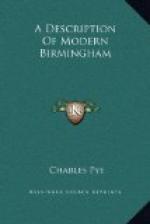Under this head, the editor considers it no more than an act of justice, to observe, that the manufacture of copper bolts, for fastening the timbers of ships together, was invented by Mr. John Westwood, an inhabitant of this town.
Brass.
This article, so necessary to the manufacturers in this town, was for a great length of time procured from the wealthy people of Bristol, which caused a manufactory, of brass to be established here, about the year 1740, but that being upon a small scale, the principal supply came from the place before-mentioned, until the year 1781, when a number of manufacturers associated together, and established a manufactory of brass, upon an extensive scale, in this town, under the denomination of The Birmingham Metal Company.
For the purpose of supplying themselves and their neighbours with that article, at a regular rate; the Bristol people being accustomed to raise or fall the price at discretion. This gave rise to another company, who erected extensive works, and established a manufactory of brass, at Smethwick.
Trade increasing, a third company was formed, who erected works, and commenced manufacturing of brass, at Spon-lane, West-bromwich; so that the town is now amply supplied with that article; for the companies at a distance have their agents, who dispose of large quantities.
Steel House.
In the beginning of the last century, a furnace was erected on the outside of the town, for the conversion of iron into steel, and houses being erected in its vicinity, they were denominated Steelhouse-lane. That the woollen manufactory is of great importance to this kingdom must be admitted, but if the demand for fine steel goods should ever revive again, and be equally brisk as it was thirty years back, there is not in my mind a doubt, but the iron and steel trade would produce more profit to the nation than that of woollen, if it does not at the present time. Wool is produced from the surface of the earth, and iron is by dint of labour collected from its bowels; consider the numerous hands employed in the mines and the furnaces to bring it into a rough state, either for casting or the forge, and when it is in a proper state for either, the endless variety of articles it is manufactured into; the whole export of which, being all produced by labour, is every shilling of it profit to the nation. Gold can only be wrought in any quantities to a certain determinate value, but who can fix the price at which articles made of steel may be sold. Should it please the Almighty to continue the blessings of a general peace, the people on the continent will soon recover themselves, and whenever that is the case, and money circulates freely among them, they will then turn their thoughts to superfluities, and as no other article will bear so high a polish and appear so brilliant as those which are manufactured of steel, there is the greatest probability of that trade being revived.—An attempt to enumerate the different articles now made in iron and steel, would be in vain; yet none of the more valuable are at this time in request.




